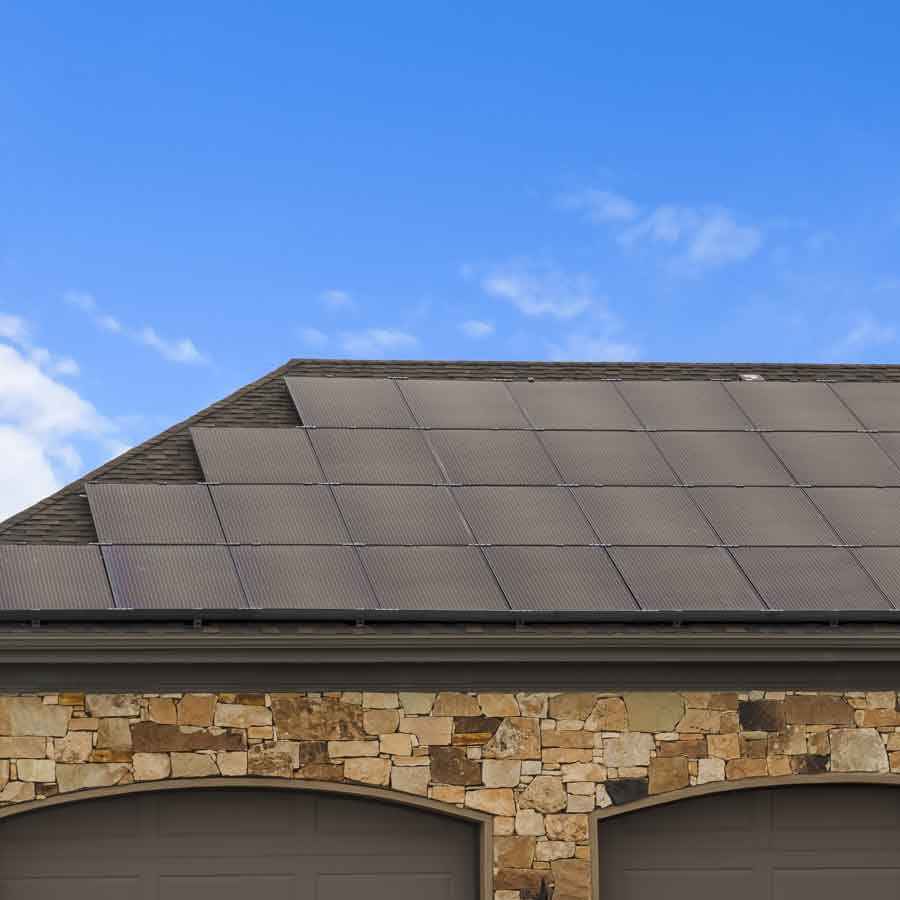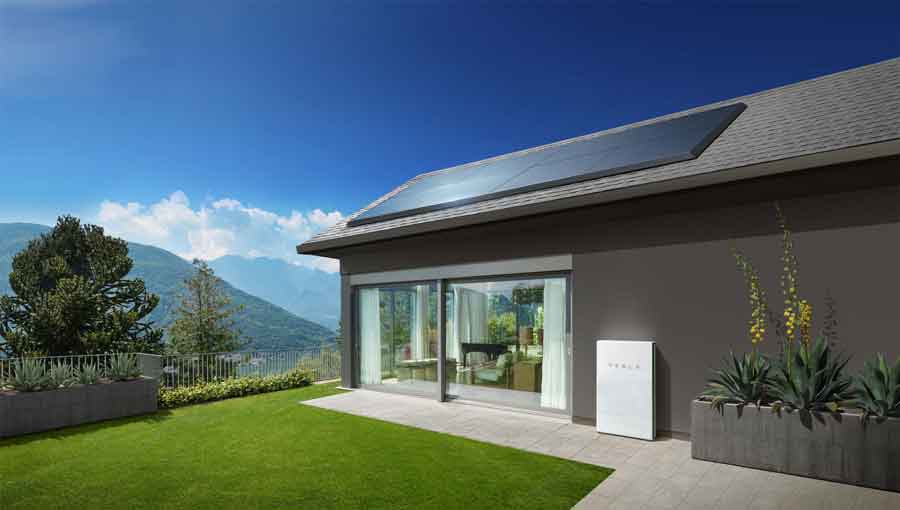Solar power is becoming more affordable and easier to install in our homes. Some homeowners, especially those with detached garages, wonder if they can install solar panels on their garage roofs.
The goal is usually to be able to power their overhead garage lighting without taking energy from the power grid.
The short answer is that you can put solar panels on a garage roof as long as its slope allows.
As with everything, there are additional things to think about, which we’ll cover in this article.

Considerations When Installing Solar Panels on a Garage
Detached garages are a great place to install solar panels. If you don’t like the look of solar panels on your house, installing them on a detached garage keeps them out of view and preserves your home’s curb appeal.
Generally speaking, solar panels can be placed in various locations. However, there are a couple of criteria that need to be met first:
- They can’t be placed in the shade
- It must have an unobstructed view
- The location needs to be structurally sound
- If placed on a roof, the roof needs to be in good shape
- They need to be compliant with your HOA (if applicable)
The biggest concern is that the area gets enough sun during peak daylight hours in all seasons. As long as you do, most garages will easily be able to meet the other conditions.
Detached garages are typically behind the house. So, if your HOA has strict rules about aesthetics, you have a better chance of being able to install solar panels on your garage if it can’t be seen from the street.
The shape of your roof also plays a big part in how many panels you can use. Gable roofs typically have plenty of room for several solar panels. However, Gambrel and hip roofs don’t have much room for solar panels, although they might look like they do.
Here in the United States, solar panels must face south and be aimed at the appropriate angle, depending on your home’s latitude.
Unfortunately, that means many roofs will not be ideal locations for solar panels.
Solar Panels and The Condition of Your Roof
Speaking of your roof, it’s critical that your roof is in good shape before installing solar panels.
If you think you will need to replace the roof in the near future, plan to do it before you install the solar panels. The panels will need to be removed during the roof work and that can get expensive.
How expensive?
EnergySage says that “on average, residential installations tend to cost somewhere between $1,500 to $6,000 to remove and reinstall.”
Before you install solar panels on your garage roof (or house roof), ask these questions:
- Is the roof structurally sound?
- Can it hold the weight of solar panels?
- When was the roof last replaced?
- When will the roof need to be replaced?
If you have any doubts, find an inspector to make sure your garage is structurally sound and that the roof will be able to hold the panels before you purchase them.
Why Put Solar Panels On Your Garage Roof?
Many people are turning to solar power as an alternative source of electricity. Not only is it cleaner and more efficient, but it’s a great way to lower your electric bills.
That was more than enough incentive to install solar panels in my home.
There are many benefits of installing solar panels on your property.
Here are a few reasons why many people switch to solar power:
Lower Utility Bills
Solar power lowers my electricity bill by 30%-40% each month. I’m not at the point where I can completely replace the power company, but solar helps to keep it manageable.
How so?
When the panels are installed on your property, they begin to produce power for your home.
Depending on how your community handles solar power, your house will use the electricity generated by the panels first.
Here in Florida, it’s a bit different.
We’re still “on the grid” even if your home produces all the power you need through solar. Any energy created by my home’s solar panels is deducted from my monthly electricity bill.
However, many homes lack the roof space for enough solar panels, or they get too much shade.
Unfortunately, in that case, the solar panels won’t produce enough power to support the home, and you’ll still need to use energy from the electric grid.
However, even if you still rely on the power grid, every bit of solar power produced will help lower your energy bill.

Going Off-Grid With Solar
Depending on where you live, it’s possible to not need your power company.
When the sun’s out during the day, your solar panels might be able to provide enough electricity to power your home. But what happens at night?
To completely go off-grid, you’ll need solar batteries.
Solar batteries store excess power generated, so you’ll be able to use it at night or on cloudy days.
I have a small, 2kW solar panel system, which doesn’t produce enough electricity to take my house off the grid. I’d need roughly an 8kW system for that.
For most people, going off-grid is an expensive project. It requires enough solar panels and a battery large enough to hold the excess electricity.
While that might put it out of reach for many homeowners, the electricity savings might be worth it. Historically, you can recoup your investment as long as you stay in the home long term.
Eco-Friendly Option
Solar power is one of the clean, renewable sources of energy. It doesn’t pollute the air or water, although some materials used to make the panels are toxic.
The only major downside to using solar power is how much space it takes up. Near my house is a massive solar farm that takes up acres and acres of land.
Putting solar panels on existing buildings, however, avoids that problem. They make use of space that’s otherwise not being used.
Your garage roof protects your car from the elements, so make it even more helpful by adding solar panels to produce energy.
Wrapping It Up
You can install solar panels on the roof of your garage or house as long as the roof gets enough sunlight and is structurally able to support the weight of the panels.
Installing solar panels on the garage is advantageous in many homes because the garage is away from street view, making the panels less of an eyesore.
In many cases, the garage receives more sunlight than the house and has fewer obstructions.
Once you’ve installed your solar panels, the next step is to channel that power to your garage. But there’s more to charging your EV than just plugging it in. To make sure you have the correct type of outlet for electric vehicles, check out our guide here.
